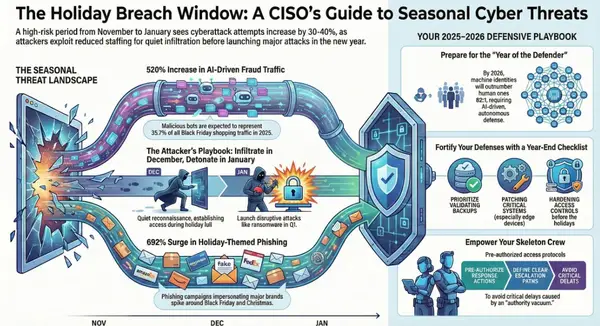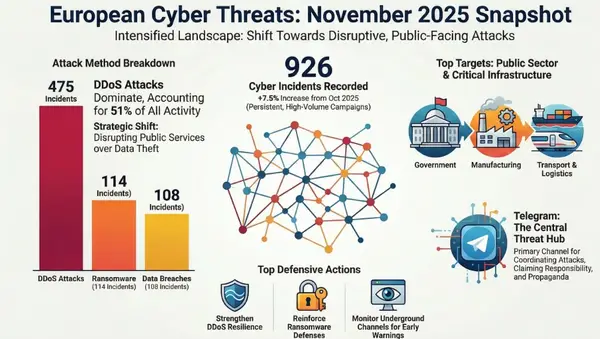Hyundai Data Breach: 2.7 Million Vehicle Owners Potentially Exposed in Latest Automotive Cybersecurity Incident

November 2025 - Hyundai Motor Group is notifying millions of customers about a significant data breach that occurred earlier this year, marking the latest in a troubling series of cybersecurity incidents affecting the automotive industry. The breach, which targeted Hyundai AutoEver America (HAEA), the IT services arm serving Hyundai, Kia, and Genesis brands, potentially exposed sensitive personal information of up to 2.7 million vehicle owners across North America.

Timeline: Eight Months from Breach to Disclosure
The attack timeline reveals concerning gaps in the company's response:
- February 22, 2025: Unauthorized actors gain initial access to HAEA systems
- March 1, 2025: HAEA becomes aware of the cyber incident
- March 2, 2025: Company claims to have expelled the threat and contained the breach
- October 30, 2025: Notification letters finally begin arriving to affected customers
This eight-month delay between discovery and notification has raised significant questions about transparency and regulatory compliance in data breach disclosure protocols.
What Data Was Compromised?
According to notification letters filed with state Attorney General offices, the breach potentially exposed highly sensitive personal information:
- Full names
- Social Security numbers
- Driver's license numbers
- Home addresses
- Phone numbers
- Email addresses
The exposure of Social Security numbers represents a particularly serious risk factor, as Pete Luban, Field CISO at AttackIQ, explains: "Social Security numbers are not as easily changed as passwords or credit card information, resulting in a greater opportunity for threat actors to establish fraud schemes with the stolen data."
Update: Scope Clarification Contradicts Initial Reports
Following the initial wave of media coverage, HAEA issued a significant clarification that dramatically reduced the estimated impact. According to a company spokesperson, the breach affected "approximately 2,000 individuals, primarily current and former Hyundai AutoEver America and Hyundai Motor America employment-related individuals," with the exposed data being employment-related rather than general customer or connected vehicle data.
This clarification stands in stark contrast to initial reports suggesting millions of customers were affected, though the company maintains HAEA's connected car and IT security services are integrated with more than 2.7 million vehicles across North America.
Hyundai AutoEver America: The Digital Backbone
HAEA serves as the technological nervous system of the Hyundai Motor Group in North America. The company's responsibilities include:
- Developing software used in all Hyundai, Kia, and Genesis vehicles
- Managing connected car features and services for 2.7 million vehicles
- Providing IT infrastructure for approximately 2,300 dealership locations
- Operating IT help desk support across three automotive brands
- Maintaining customer databases and service records
This central role in the automotive ecosystem made HAEA an attractive target for cybercriminals, offering potential access to vast troves of customer data and proprietary automotive technology.
Part of a Disturbing Pattern
This incident represents the third major data breach affecting Hyundai operations in as many years:
2023: European Regional Breach
Hyundai's divisions in Italy and France notified customers of a breach exposing emails, home addresses, telephone numbers, and vehicle chassis numbers.
January 2024: Black Basta Ransomware Attack
The Russian-linked Black Basta ransomware group claimed to have infiltrated Hyundai Motor Corporation's European division, allegedly exfiltrating 3TB of data. The company initially downplayed the incident as "IT issues" before eventually confirming the ransomware attack.
February 2025: North American IT Infrastructure Breach
The current incident affecting HAEA represents the largest potential impact, with systems integrated across millions of vehicles compromised.
The Broader Automotive Cybersecurity Crisis
The Hyundai breach is far from an isolated incident. The automotive industry has become a prime target for sophisticated cyber attacks, as detailed in our comprehensive analysis of car hacking vulnerabilities across manufacturers.
Recent High-Profile Automotive Breaches
CDK Global Attack (June 2024): Perhaps the most disruptive automotive cyberattack to date, the ransomware attack on CDK Global's dealership management system crippled approximately 15,000 auto dealerships across North America. The company ultimately paid a $25 million ransom to the BlackSuit ransomware group to restore operations, highlighting the critical dependency on software providers throughout the automotive supply chain.
Stellantis Data Breach (September 2025): The multinational automaker confirmed unauthorized access to its Salesforce platform, with the ShinyHunters extortion group claiming to have stolen over 18 million records containing customer names and contact details.
Toyota Multiple Incidents: The Japanese automaker has faced a series of breaches and data exposures, including a 240GB data leak in December 2022 that exposed employee information, customer data, and internal corporate materials.
Why Automotive Companies Are Prime Targets
Modern vehicles have evolved into sophisticated data collection systems on wheels. As noted in cybersecurity research, today's cars contain:
- Over 100 interconnected electronic control units (ECUs)
- Millions of lines of code
- Multiple communication protocols and wireless connections
- Cloud-connected services storing payment information
- Telematics systems tracking location and driving behavior
A 2023 investigation by the Mozilla Foundation ranked cars as "officially the worst category of products" for privacy protection, while automotive hacking incidents have increased by 225% over the past five years, with remote attacks accounting for 85% of all breaches.
Attack Vectors: How Cybercriminals Target Automotive Infrastructure
While HAEA has not disclosed the specific attack vector used in this breach, automotive cybersecurity experts have identified several common entry points exploited in similar incidents:
Third-Party Vendor Vulnerabilities
Many automotive breaches originate from compromised third-party service providers with access to manufacturer systems. The 2021 Volkswagen/Audi breach affected 3.3 million customers due to a third-party vendor leaving data unsecured.
Credential Theft and Access
Threat actors frequently obtain valid credentials through phishing, social engineering, or purchasing leaked credentials from the dark web. Research shows that approximately 1% of automotive company credentials have been exposed on cybercrime forums.
Supply Chain Attacks
One automotive supplier documented being breached by three separate ransomware gangs (LockBit, Hive, and ALPHV/BlackCat) within two weeks, all exploiting the same initial entry point from a firewall misconfiguration.
Ransomware-as-a-Service (RaaS)
Professional ransomware operations have industrialized cyber attacks against the automotive sector, with groups like BlackSuit, Black Basta, and others specifically targeting high-value automotive infrastructure.
Expert Analysis: The Identity Theft Risk Factor
Security experts warn that the exposure of Social Security numbers in the HAEA breach creates elevated risks for affected individuals:
Primary Threats:
- Long-term Identity Fraud: Unlike passwords or credit cards, SSNs cannot be easily changed, providing persistent attack vectors
- Secondary Wave Attacks: Phishing campaigns targeting breach victims with fake credit monitoring offers or fraudulent notifications
- Credential Cross-Referencing: Stolen data from this breach can be combined with information from previous breaches to create detailed profiles for targeted attacks
- Financial Account Takeover: Driver's license numbers combined with SSNs provide sufficient information for opening fraudulent accounts
Recommended Actions for Affected Customers
HAEA is offering complimentary two-year credit monitoring services to affected individuals. Security experts recommend additional protective measures:
Immediate Steps
- Monitor Financial Accounts: Check bank and credit card statements daily for unauthorized activity
- Place Fraud Alerts: Contact credit bureaus to place fraud alerts on credit reports
- Review Credit Reports: Obtain free credit reports from all three major bureaus
- Enable Multi-Factor Authentication: Activate MFA on all financial and important accounts
- Document Everything: Keep records of all breach notifications and suspicious activities
Ongoing Vigilance
- Beware of Phishing: Expect increased phishing attempts disguising themselves as breach follow-ups
- Verify Communications: Only use official Hyundai websites and phone numbers
- Consider Credit Freeze: For maximum protection, consider freezing credit reports
- Monitor Identity: Watch for unfamiliar credit inquiries or new accounts
- Update Passwords: Change passwords on accounts that may have used the same email address
Red Flags to Watch For
- Unexpected credit denials or account closures
- Bills for services not ordered
- Collection notices for unknown debts
- IRS notifications about duplicate tax returns
- Medical bills for services not received
Regulatory and Legal Implications
The eight-month delay between breach discovery and customer notification raises potential regulatory concerns:
State Breach Notification Laws
Most U.S. states require organizations to notify affected individuals "without unreasonable delay" following a data breach. While definitions vary, eight months typically exceeds reasonable timelines.
Federal Trade Commission Oversight
The FTC has increased scrutiny of data security practices in the automotive industry. In 2024, the agency took enforcement action against General Motors for selling customer driving data without adequate consent.
Potential Class Action Litigation
Major data breaches involving Social Security numbers frequently result in class action lawsuits alleging inadequate data protection and delayed notification.
Department of Commerce Connected Vehicle Rules
In January 2025, the Department of Commerce issued final rules banning connected vehicle software and hardware from Russia and China, citing cybersecurity concerns. The Hyundai breach may prompt additional regulatory action regarding automotive cybersecurity standards.
Industry Response: Calls for Stronger Cybersecurity
The HAEA breach has reignited debates about automotive cybersecurity preparedness:
Pete Luban, AttackIQ: "Hyundai must take proactive steps to prevent threat actors from being able to access gaps in their defenses, or risk future breaches as attackers pounce on the opportunity to steal from Hyundai's unguarded pool of information."
National Highway Traffic Safety Administration: Peter Simshauser, chief counsel at NHTSA, warned at a recent conference that while connected vehicle features "support important safety features and satisfy consumer demand, they enable the potential for a bad actor to cause harm."
The Connected Vehicle Paradox
As explored in our detailed analysis of automotive hacking vulnerabilities, the automotive industry faces a fundamental paradox: the same connectivity features that enable convenience, safety, and innovation also create expanding attack surfaces for cybercriminals.
The Data Collection Dilemma
Modern vehicles collect extensive data about their drivers:
- Real-time location tracking
- Driving behavior and patterns
- Biometric data from driver monitoring systems
- Payment information stored in infotainment systems
- Personal information from connected mobile apps
- Voice recordings from virtual assistants
This data concentration creates high-value targets while simultaneously making breaches more damaging when they occur.
Hyundai's Response and Remediation
In response to the breach, HAEA has implemented several measures:
- Third-Party Forensic Investigation: Engaged external cybersecurity experts to conduct comprehensive incident analysis
- Law Enforcement Coordination: Working with federal and state authorities on breach investigation
- System Hardening: Implemented additional security controls to prevent future unauthorized access
- Customer Notification Program: Launched coordinated notification campaign with credit monitoring offers
- Monitoring Protocols: Hyundai Motor Group is monitoring the situation to ensure appropriate safeguards are in place
However, critics note that these measures represent reactive responses rather than the proactive security posture needed to prevent breaches in the first place.
Lessons for the Automotive Industry
The HAEA breach offers several critical lessons for automotive manufacturers and their technology partners:
1. Third-Party Risk Management
IT service providers with access to customer data must be held to the same security standards as primary manufacturers. Supply chain cybersecurity cannot be an afterthought.
2. Rapid Detection and Response
The nine-day window between initial compromise and detection suggests inadequate monitoring and threat detection capabilities. Modern automotive IT infrastructure requires 24/7 security operations centers with advanced threat detection.
3. Transparent Communication
Eight months between breach discovery and customer notification erodes trust and may violate legal requirements. Organizations must balance investigative thoroughness with timely disclosure obligations.
4. Data Minimization
Organizations should critically evaluate whether collecting and retaining sensitive data like Social Security numbers is necessary for their operations. The best way to protect data is not to collect it in the first place.
5. Incident Preparedness
The pattern of repeat breaches at Hyundai suggests lessons from previous incidents may not have been adequately internalized. Comprehensive incident response plans must include post-mortem analysis and security improvement implementation.
The Future of Automotive Cybersecurity
As vehicles become increasingly connected and autonomous, the cybersecurity challenges will only intensify. Industry experts predict:
Emerging Threats
- AI-Powered Attacks: Machine learning enabling more sophisticated and adaptive cyber attacks
- Supply Chain Complexity: Expanding networks of suppliers and partners creating additional vulnerabilities
- Electric Vehicle Infrastructure: Charging networks representing new attack vectors connected to power grids
- Over-the-Air Updates: Software update mechanisms potentially weaponized for malicious code delivery
- Vehicle-to-Everything (V2X): Connected infrastructure communications creating city-wide attack surfaces
Regulatory Evolution
Expect increased government oversight and mandatory cybersecurity standards for connected vehicles, potentially including:
- Mandatory security testing and certification requirements
- Stricter data breach notification timelines
- Enhanced penalties for inadequate cybersecurity practices
- Requirements for security-by-design in automotive development
Conclusion: A Wake-Up Call for Automotive Cybersecurity
The Hyundai AutoEver America data breach serves as another stark reminder that the automotive industry's digital transformation has outpaced its cybersecurity maturity. With 2.7 million vehicles potentially connected to compromised systems, even if the actual data exposure affected far fewer individuals, the incident highlights systemic vulnerabilities in automotive IT infrastructure.
For the millions of Hyundai, Kia, and Genesis owners who received notification letters, the breach represents a personal security crisis requiring vigilant monitoring and protective action. For the automotive industry at large, it should serve as a catalyst for fundamental changes in how vehicle manufacturers approach cybersecurity, data protection, and customer privacy.
As vehicles continue evolving into sophisticated, connected computers on wheels, the industry must recognize that cybersecurity is not merely an IT concern—it's a safety imperative. The next breach could involve more than stolen Social Security numbers; it could potentially affect vehicle safety systems themselves, as explored in our comprehensive automotive hacking analysis.
The question is no longer whether automotive companies will face cyber attacks, but whether they will be prepared when attacks inevitably occur.
Resources for Affected Individuals:
- Hyundai Customer Support: Contact through official Hyundai.com website
- Credit Bureau Fraud Alerts: Equifax, Experian, TransUnion
- Federal Trade Commission: IdentityTheft.gov for identity theft recovery assistance
- Annual Credit Report: AnnualCreditReport.com for free credit reports
Related Reading:
This article will be updated as additional information becomes available about the Hyundai AutoEver America data breach and its impact on vehicle owners.






